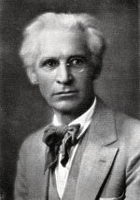William Ellery Leonard
William Ellery Leonard Poems
(After completing a book for one now dead)
(O Earth-and-Autumn of the Setting Sun,
She is not by, to know my task is done.)
...
HOW came I that loved stars, moon, and flame,
And unimaginable wind and sea,
All inner shrines and temples of the free,
...
Man's mind is larger than his brow of tears;
This hour is not my all of time; this place
My all of earth; nor this obscene disgrace
...
Blue are the twilight heavens above the hill,
A yellow half-moon's high within the blue,
And rosy May-night clouds are soft and still,
...
I know the sorrows of the last abyss:
I walked the cold black pools without a star;
I lay on rock of unseen flint and spar;
I heard the execrable serpent hiss;
...
William Ellery Leonard Biography
William Ellery Leonard (January 25, 1876, in Plainfield, New Jersey – May 22, 1944, in Madison, Wisconsin) was an American poet and literary scholar. From 1906 until the end of his life, Leonard taught at the University of Wisconsin–Madison, being an assistant professor of English. Among his prominent students were literary critic Leslie Fiedler and poet Clara Leiser, the latter an outspoken opponent of Nazism. Over his career Leonard wrote numerous volumes of poetry, the first of which was Sonnets and Poems, a collection regarded as showing emotional intensity as well as psychological depth. He is most remembered, however, for Two Lives, a cycle of 250 sonnets telling the story of his tragic marriage. Stephen Vincent Benét called it the best American poem of the twentieth century. In his psychological autobiography, The Locomotive-God, he probed his agoraphobia. Leonard is also known for his many scholarly works, particularly translations of Aesop and Lucretius as well as the epic Beowulf.)
The Best Poem Of William Ellery Leonard
Indian Summer
(After completing a book for one now dead)
(O Earth-and-Autumn of the Setting Sun,
She is not by, to know my task is done.)
In the brown grasses slanting with the wind,
Lone as a lad whose dog's no longer near,
Lone as a mother whose only child has sinned,
Lone on the loved hill . . . and below me here
The thistle-down in tremulous atmosphere
Along red clusters of the sumach streams;
The shrivelled stalks of golden-rod are sere,
And crisp and white their flashing old racemes.
(. . . forever . . . forever . . . . forever . . .)
This is the lonely season of the year,
This is the season of our lonely dreams.
(O Earth-and-Autumn of the Setting Sun,
She is not by, to know my task is done!)
The corn-shocks westward on the stubble plain
Show like an Indian village of dead days;
The long smoke trails behind the crawling train,
And floats atop the distant woods ablaze
With orange, crimson, purple. The low haze
Dims the scarped bluffs above the inland sea,
Whose wide and slaty waters in cold glaze
Await yon full-moon of the night-to-be,
(. . . far . . . and far . . . and far . . .)
These are the solemn horizons of man's ways,
These are the horizons of solemn thought to me.
(O Earth-and-Autumn of the Setting Sun,
She is not by, to know my task is done!)
And this the hill she visited, as friend;
And this the hill she lingered on, as bride --
Down in the yellow valley is the end:
They laid her . . . in no evening autumn tide . . .
Under fresh flowers of that May morn, beside
The queens and cave-women of ancient earth . . .
This is the hill . . . and over my city's towers,
Across the world from sunset, yonder in air,
Shines, through its scaffoldings, a civic dome
Of piled masonry, which shall be ours
To give, completed, to our children there . . .
And yonder far roof of my abandoned home
Shall house new laughter . . . Yet I tried . . . I tried
And, ever wistful of the doom to come,
I built her many a fire for love . . . for mirth . . .
(When snows were falling on our oaks outside,
Dear, many a winter fire upon the hearth) . . .
(. . . farewell . . . farewell . . . farewell . . .)
We dare not think too long on those who died,
While still so many yet must come to birth.
